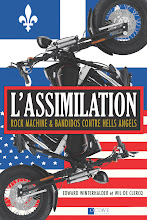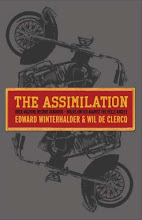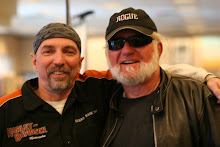By Don Hennigan
From November of 2006
Motorcycle travel books are an established genre, from Robert Edison Fulton, Jr.'s One Man Caravan to Alan Noren's Storm. Such books written by women, however, are still relatively rare. Karen Larsen's book Breaking the Limit recounts "one woman's journey" from Princeton, New Jersey to Alaska and back, on "Lucy," a used Harley-Davidson 1200 Sportster, modified with a larger gas tank and windshield. While it might be argued that most motorcycle travel books emphasize the adventures and dangers, Larsen does, at least in part, the reverse: she is intent on demystifying motorcycle travel for non-riders while invoking all its pleasures.
Traditionally books about motorcycle clubs are written by outsiders who ride for a time with the club or by members who have left the club. Out in Bad Standings is written by a member who has left the Bandidos Motorcycle Club "in good standings" but soon had his status changed to "out in bad standings" after El Presidente George Weger realized how much Ed "Connecticut Ed" Winterhalder truly knew about the club. Motorcycle club descriptions usually focus on the negative aspects of a particular club, such as Thompson's Hell's Angels or Daniel Wolf's The Rebels. Violence, or the promise of violence, is always a centerpiece of these books.
Winterhalder offers a somewhat different approach in his book. He was a well-respected member of the Bandidos before he left, and his book reflects that relationship and his respect for the years he spent with the club. The book covers the period from 1999 through 2005 and Winterhalder's attempt to assimilate the club Rock Machine into the Bandidos with all of the violence and death reported in an impersonal and matter of fact manner. Weger wanted this time to be seen as a reform movement in the Bandidos' history, but unfortunately the book ends with Weger and others being indicted on conspiracy charges.
Connecticut Ed explores the six-year period that starts with Weger's appointment, his expressed desire to reform the club, Winterhalder's efforts in that reform movement, and the eventual failure of the attempt to clean up the club's image. Weger did manage to change some of the traditions that were used to express love for one's brother such as pissing on the new members to instill a feeling of acceptance and the beatings meant to build solidarity among members or to maintain discipline.
Winterhalder does a good job of giving readers a detailed peek inside one of the world's most notorious motorcycle clubs. The book examines the prospect's experiences, why the prospect period is used, and all of the other details that a future member is expected to know. Indeed, instructions on proper etiquette toward patch holders are taken right out of the Bandidos' membership book. The Bandidos' by-laws are also included to illuminate club responsibilities and the day-to-day workings of the club.
As an alternate way of evaluating the manuscript, I shared it with a couple of friends who are members of what the mainstream media would undoubtedly identify as outlaw clubs, and both of them were surprised that Winterhalder had included the by-laws. Each club has its own by-laws and their own constitution, which they guard as their secret to success and their code of ethics tailored to meet the needs of a particular group; it is unfathomable to members that a person would be so blatant in disregarding this traditional taboo. Printing the by-laws for the public to read is the one thing that could cost Winterhalder a great deal, unless the "out in bad standings" is all smoke and mirrors, and Connecticut Ed actually had permission to share them.
Winterhalder also goes into detail about the secret dealings between clubs, especially between the Hells Angels and the Bandidos. Agreements to not invade another club's territory or to interfere with the workings of the other club are seldom honored since there does not appear to be any honor between enemies in the realm of outlaw motorcycle clubs. Winterhalder gives the impression that the Bandidos are always the victims of violence that is precipitated against them, mostly by their arch nemesis, the Hells Angels. The history of the media sensationalizing crimes committed by bikers is so complete that all readers should be leery of any discussions of violence.
In the case of Out in Bad Standings, it's not Winterhalder's focus on violence against the Bandidos that raises questions but the lopsided nature of that discussion. The Bandidos are portrayed as hardworking, honest, family men who are killed for absolutely no reasons that the Bandidos can explain. Knowing the reputation of the Bandidos, the reader has to decide whether the Bandits are innocent or if the whole story of inter-club rivalry is being reported.
At times, the book reads like a log kept by riders about the trips they have taken and about the people they have met along the way, and it challenges the reader's endurance.
At other times, however, the book has the feel of being taken straight from the minutes of club meetings and delivers a sense of authenticity that is largely missing from similar exposes. Indeed, Out in Bad Standings gives the reader the sense that the Bandidos are similar to other motorcycle clubs despite their reputation of being one of the most feared motorcycle clubs in the world.
Out in Bad Standings can also be used as a template for starting a motorcycle club. The Bandidos are an example of a successful motorcycle club, and Winterhalder gives the public a wide-open view of the club's inner workings. The reader gets the impression that Winterhalder is either still a member, though he is reported to be out, or he is trying to curry favor with the club. Whichever it is, Out in Bad Standings will undoubtedly cash in on the recent rising interest in motorcycle clubs.
As a source of information about outlaw clubs, Out in Bad Standings also provides a wealth of knowledge about the organization and its dealings and politics with the outlaw world through the eyes of a well-placed ex-member. Winterhalder does not write in the traditional manner that is associated with subjects of this importance, but if one can get through the intricate first-person accounts, Out in Bad Standings is a good primary source. The book will contribute to our knowledge of the Bandidos and help fill in gaps in our knowledge of outlaw culture in general.
From November of 2006
Motorcycle travel books are an established genre, from Robert Edison Fulton, Jr.'s One Man Caravan to Alan Noren's Storm. Such books written by women, however, are still relatively rare. Karen Larsen's book Breaking the Limit recounts "one woman's journey" from Princeton, New Jersey to Alaska and back, on "Lucy," a used Harley-Davidson 1200 Sportster, modified with a larger gas tank and windshield. While it might be argued that most motorcycle travel books emphasize the adventures and dangers, Larsen does, at least in part, the reverse: she is intent on demystifying motorcycle travel for non-riders while invoking all its pleasures.
Traditionally books about motorcycle clubs are written by outsiders who ride for a time with the club or by members who have left the club. Out in Bad Standings is written by a member who has left the Bandidos Motorcycle Club "in good standings" but soon had his status changed to "out in bad standings" after El Presidente George Weger realized how much Ed "Connecticut Ed" Winterhalder truly knew about the club. Motorcycle club descriptions usually focus on the negative aspects of a particular club, such as Thompson's Hell's Angels or Daniel Wolf's The Rebels. Violence, or the promise of violence, is always a centerpiece of these books.
Winterhalder offers a somewhat different approach in his book. He was a well-respected member of the Bandidos before he left, and his book reflects that relationship and his respect for the years he spent with the club. The book covers the period from 1999 through 2005 and Winterhalder's attempt to assimilate the club Rock Machine into the Bandidos with all of the violence and death reported in an impersonal and matter of fact manner. Weger wanted this time to be seen as a reform movement in the Bandidos' history, but unfortunately the book ends with Weger and others being indicted on conspiracy charges.
Connecticut Ed explores the six-year period that starts with Weger's appointment, his expressed desire to reform the club, Winterhalder's efforts in that reform movement, and the eventual failure of the attempt to clean up the club's image. Weger did manage to change some of the traditions that were used to express love for one's brother such as pissing on the new members to instill a feeling of acceptance and the beatings meant to build solidarity among members or to maintain discipline.
Winterhalder does a good job of giving readers a detailed peek inside one of the world's most notorious motorcycle clubs. The book examines the prospect's experiences, why the prospect period is used, and all of the other details that a future member is expected to know. Indeed, instructions on proper etiquette toward patch holders are taken right out of the Bandidos' membership book. The Bandidos' by-laws are also included to illuminate club responsibilities and the day-to-day workings of the club.
As an alternate way of evaluating the manuscript, I shared it with a couple of friends who are members of what the mainstream media would undoubtedly identify as outlaw clubs, and both of them were surprised that Winterhalder had included the by-laws. Each club has its own by-laws and their own constitution, which they guard as their secret to success and their code of ethics tailored to meet the needs of a particular group; it is unfathomable to members that a person would be so blatant in disregarding this traditional taboo. Printing the by-laws for the public to read is the one thing that could cost Winterhalder a great deal, unless the "out in bad standings" is all smoke and mirrors, and Connecticut Ed actually had permission to share them.
Winterhalder also goes into detail about the secret dealings between clubs, especially between the Hells Angels and the Bandidos. Agreements to not invade another club's territory or to interfere with the workings of the other club are seldom honored since there does not appear to be any honor between enemies in the realm of outlaw motorcycle clubs. Winterhalder gives the impression that the Bandidos are always the victims of violence that is precipitated against them, mostly by their arch nemesis, the Hells Angels. The history of the media sensationalizing crimes committed by bikers is so complete that all readers should be leery of any discussions of violence.
In the case of Out in Bad Standings, it's not Winterhalder's focus on violence against the Bandidos that raises questions but the lopsided nature of that discussion. The Bandidos are portrayed as hardworking, honest, family men who are killed for absolutely no reasons that the Bandidos can explain. Knowing the reputation of the Bandidos, the reader has to decide whether the Bandits are innocent or if the whole story of inter-club rivalry is being reported.
At times, the book reads like a log kept by riders about the trips they have taken and about the people they have met along the way, and it challenges the reader's endurance.
At other times, however, the book has the feel of being taken straight from the minutes of club meetings and delivers a sense of authenticity that is largely missing from similar exposes. Indeed, Out in Bad Standings gives the reader the sense that the Bandidos are similar to other motorcycle clubs despite their reputation of being one of the most feared motorcycle clubs in the world.
Out in Bad Standings can also be used as a template for starting a motorcycle club. The Bandidos are an example of a successful motorcycle club, and Winterhalder gives the public a wide-open view of the club's inner workings. The reader gets the impression that Winterhalder is either still a member, though he is reported to be out, or he is trying to curry favor with the club. Whichever it is, Out in Bad Standings will undoubtedly cash in on the recent rising interest in motorcycle clubs.
As a source of information about outlaw clubs, Out in Bad Standings also provides a wealth of knowledge about the organization and its dealings and politics with the outlaw world through the eyes of a well-placed ex-member. Winterhalder does not write in the traditional manner that is associated with subjects of this importance, but if one can get through the intricate first-person accounts, Out in Bad Standings is a good primary source. The book will contribute to our knowledge of the Bandidos and help fill in gaps in our knowledge of outlaw culture in general.


















No comments:
Post a Comment